
Update – October 3rd, 2022: The Zwift Hub has now started shipping, and with it, I’ve released my full Zwift Hub In-Depth Review. In that review, you’ll find my accuracy testing on the final firmware/hardware, as well as all the other usual testing bits. I’d recommend reading that instead of this older post done on a pre-production unit.
A few months ago Zwift semi-announced the cancellation of their smart bike (Zwift Ride) and corresponding Zwift Wheel smart trainer. In doing so, they laid off a significant number of employees, and concurrently committed to getting back to partnerships with the industry. And indeed, those partnerships have seemed to start appearing again. However, that was somewhat based on the assumption that Zwift wasn’t making their own smart trainer.
Today, that changes.
Zwift has just announced their Zwift Hub, a $499 smart trainer that will likely slaughter pricing in the market. Well, maybe. First, it requires Zwift to make it accurate. But assuming they do that, the product has specs that are roughly half the cost of most of their other competitors.
Now, before we go too far, it’s important to know one key detail: Zwift didn’t make this trainer. At least not entirely. Instead, they’re rebranding the JetBlack Volt smart trainer (which I reviewed a year ago), and repricing it significantly lower than the $849 it previously was. That very capable direct drive trainer did quite well in my testing, arguably better than some of the large trainer companies have done at the same price point.
What Zwift has done is take that trainer, add a dash of orange to it, make setup easier via some nifty bits of cardboard (seriously, it’s actually brilliant), and add a few bits of integration into the Zwift companion app. They didn’t take away any 3rd party compatibility, thus, you can buy the Zwift trainer and use it with any 3rd party app via the established industry trainer standards. I did exactly that in my testing.
But before we get too far, note that this is not an in-depth review. I’ll get to the details of why it’s not a bit later on, but the TLDR version is it’s not baked yet. This trainer won’t launch until October 3rd, and you won’t be able to buy it till then. Once it finishes baking (namely, the firmware), then I’ll release a full in-depth review. Till then, this is more of a hands-on explainer.
Got it? Good, let’s dive into the specs.
The Specs:
First, just a quick run through the top-line specs, which are identical to the JetBlack Volt because it’s the same hardware (something Zwift confirmed as well, there are no changes here):
– Direct drive trainer: This means you remove your rear wheel
– Flywheel: It has a flywheel weight of 4.7kg
– Cassette: A cassette is included, and you choose how many speeds (8/9/10/11/12) upon ordering on Zwift’s site. Which is then officially compatible with Shimano and SRAM drivetrains (unofficially, 11sp Campagnolo will also work on Shimano cassettes, just as many users do so today on Jetblack and other trainers)
– Sound: Essentially silent. Only the sound of your drivetrain is heard.
– Handle: This unit lacks a handle, which continues to make it slightly awkward to move around.
– Protocol Compatibility: ANT+ FE-C, ANT+ Power, Bluetooth Smart Trainer Control, Bluetooth Smart Power (everything you need)
– Unique Party Trick: Can rebroadcast your heart rate sensor within a single channel, ideal for Apple TV Zwift users (who are Bluetooth channel limited)
– App Compatibility: Every app out there basically (Zwift, TrainerRoad, Rouvy, RGT, The Sufferfest, Kinomap, etc…)
– Skewer Compatibility: All the skewers and adapters you could ask for: Road 130mm, 135mm, 142x12mm, 148x12mm
– Max Incline: 16% simulated grade
– Max Wattage: 1,800 watts resistance (or 1,300w @ 40KPH)
– Stated Accuracy: < +/-2.5%
– Power Cable Required: Yes, power block compatible with 100-240v
– Pricing and Availability: $499USD, £449, 499EUR, order/ship October 3rd
Just for context, these specs are very similar to the Wahoo KICKR CORE, which costs $899 without a cassette (figure another $50 for that). The JetBlack VOLT, when sold with JetBlack branding was $849USD, or 749EUR (though, it went for about 700EUR street price, including an 11-speed cassette).
What’s Different About It?
Now, as I noted earlier on, this is merely a rebranded JetBlack Volt. Honestly, that’s a smart move. Zwift futzing about trying to create their own smart trainer/bike when plenty of very solid companies existed to acquire or OEM, just didn’t make a lot of sense. As I noted at the top, the JetBlack VOLT is a legit good trainer. It competes just fine with mid to upper-end trainers quite easily. Plus, it already had an orange color scheme.
So, what has Zwift changed?
Well, things fall into basically three buckets:
A) The outer box it comes in, setup guides, pamphlets, etc…
B) The exterior paint scheme of the trainer
C) The firmware: This controls things like accuracy, features integration, etc…
Starting off with the box, here’s the new box it comes in. Though, I think this isn’t entirely finished yet either. But – I do like the look of it:
Next, there’s the setup guides. And this is arguably the biggest change. To people that can rattle off bottom bracket and similar standards, knowing exactly which skewer/axle type you have is old hat. But for most others, especially those new to the sport, it can be confusing. Zwift aims to solve this with these cardboard cards that you slide in between your rear dropouts, which handily gives you the exact specification and then color-coded adapters that are zip-tied to the cards.
It fits here:
It’s absolutely freakin’ brilliant. And why on earth nobody else thought of this before seems idiotic in hindsight. But hey, kudos to them! Also, there’s a very thorough and very well-done manual. Nobody else has an as clean or easy to use manual as Zwift does.
And that’s largely because Zwift repeated numerous times in our conversation that they wanted to make it easier for people who have never had a trainer before, to get the Zwift Hub up and running. All these little things matter.
For example, when you put on the legs of the trainer, they have a little warning symbol which will only show if you put the legs on the wrong direction. Not only that, the legs are color-coded to match the frame of the trainer, again, so you just match the colors.
If you’ve ever assembled a Wahoo KICKR CORE or the original JetBlack Volt, you’d know it’s relatively easy to put the legs on the wrong orientation (and have it work too).
The last change is the firmware. Zwift has made the firmware their own, so it shows up properly as the Zwift Hub using standard protocols, and integrates with the Zwift Companion App for firmware updates and heart rate sensor pairing. You can see the firmware update portion here:
Further, if you have Apple TV, you can use the heart rate sensor pass-through option. This is useful due to Apple TV’s 2-Bluetooth connection limitation. Thus normally if you wanted to connect your trainer + heart rate sensor + steering, you’d be one short. Here, the Zwift hub connects to your heart rate sensor and then re-broadcasts it as part of the trainer data stream (also including power/cadence/control), so it in total only takes up one channel:
This of course works with any app (I used it with TrainerRoad too), but it is particularly useful for Apple TV trainer apps.
First Rides Thoughts:
Now using the trainer was pretty straightforward. I cracked open Zwift and then paired it up in the pairing menu. First as the controllable trainer, then power source, then cadence, and finally also the heart rate channel. You don’t have to use the HR re-broadcasting, but I did on a few rides.
Next, you’ll do whatever ride it is that you want to do on Zwift, be it an ERG ride (structured workout) or a regular SIM ride (just normal riding where it changes the gradient). All of this works just like any other trainer, namely because it is any other trainer – just now with Zwift branding.
In terms of ride feel, it’s quite good. Just like the previous branded JetBlack Volt was. It’s pretty much the same ride feel and inertia as the Wahoo KICKR CORE is. So yes, it’s very good for the price.
Sound/noise-wise, it’s silent. The only sound/noise you’re going to hear is your own drivetrain, so depending on how clean that is, that’ll determine how much noise you hear. I include a little snippet of it within the video.
Next, it’s fully compatible with other apps too. Since it uses the industry standard ANT+ FE-C and Bluetooth FTMS trainer control standards, I had no issues using it with TrainerRoad or Rouvy, to name two. Nor any problems pairing it to my watches (up till the most recent firmware broke that non-trainer connectivity, but I’m told that’s coming back in the next firmware version).
Which then leaves accuracy. To step back briefly, the original JetBlack Volt had very solid accuracy. Things were great in my testing. This time around with the Zwift Hub though, testing it on three different bikes with half a dozen power meters, I ran into some not-so-small accuracy issues. These snags were mirrored by others.
As a result, this isn’t a review, since the firmware that you’ll be getting won’t mirror what I’m currently using. Zwift isn’t going to start selling or shipping units till October 3rd. In my discussions with them last week, they asked to hold off on a review and data analysis while they go back to the drawing board. That’s a fair request, given I generally don’t publish “reviews” unless a product is for sale, or already shipping. Thus ensuring what I have matches what you have.
Then, just a few hours ago (yes, today), they sent over an e-mail confirming they found two items that contributed to the accuracy issues I and others were seeing on recent firmware, and believe they have them fixed for the next firmware update. That firmware version isn’t yet available to me, but likely will be within the next few days. Once I get that, and go back and put it through its paces over the course of a number of rides, I’ll circle back with a full in-depth review.
Summary:
Assuming Zwift can sort out the accuracy issues I stumbled into (and I have every reason to believe they will, given it was perfectly functional until recent firmware), this trainer will absolutely gut the low to mid-range trainer sales from their partners/competitors. There’s simply zero reason to purchase anything else below $900, except perhaps the Wahoo KICKR CORE since it includes integration with the Wahoo KICKR CLIMB (and has dual Bluetooth connections). Almost everything else below $900 has the same or lesser specs as the Zwift Hub, but at a higher price. Of course, at launch, the Zwift Hub is only going to be available in the US/UK/EU, of which there are more than a handful of countries outside of those three areas.
When you get to the $1,000+ trainers, then things get a bit more complicated, as the specs tend to increase, both in things like gradient simulation as well as road feel (slightly). I’m interested to see how Zwift’s competitors react here, both in terms of pricing, but also just the simple fact that this isn’t entirely truthful to what Zwift implied they were doing back in May when they said they were stopping development of their smartbike/trainer. Perhaps the nuance there was “that trainer”, or more specifically the Zwift Wheel, versus this trainer.
Either way, more to come down the road once I get the final firmware, and continue putting it through its paces. Plus, this is apparently the start of new trainer announcement season, with Saris also announcing a new Saris H4 smart trainer today. Things are getting warmed up!
With that – thanks for reading!
Found This Post Useful? Support The Site!
Hopefully you found this review/post useful. At the end of the day, I’m an athlete just like you looking for the most detail possible on a new purchase – so my review is written from the standpoint of how I used the device. The reviews generally take a lot of hours to put together, so it’s a fair bit of work (and labor of love). As you probably noticed by looking below, I also take time to answer all the questions posted in the comments – and there’s quite a bit of detail in there as well.
If you're shopping for the Zwift Hub or any other accessory items, please consider using the affiliate links below! As an Amazon Associate I earn from qualifying purchases. It doesn’t cost you anything extra, but your purchases help support this website a lot.
And finally, here’s a handy list of trainer accessories that most folks getting a smart trainer for the first time might not have already:
And of course – you can always sign-up to be a DCR Supporter! That gets you an ad-free DCR, access to the DCR Shed Talkin' video series packed with behind the scenes tidbits...and it also makes you awesome. And being awesome is what it’s all about!
Thanks for reading! And as always, feel free to post comments or questions in the comments section below, I’ll be happy to try and answer them as quickly as possible. And lastly, if you felt this review was useful – I always appreciate feedback in the comments below. Thanks!


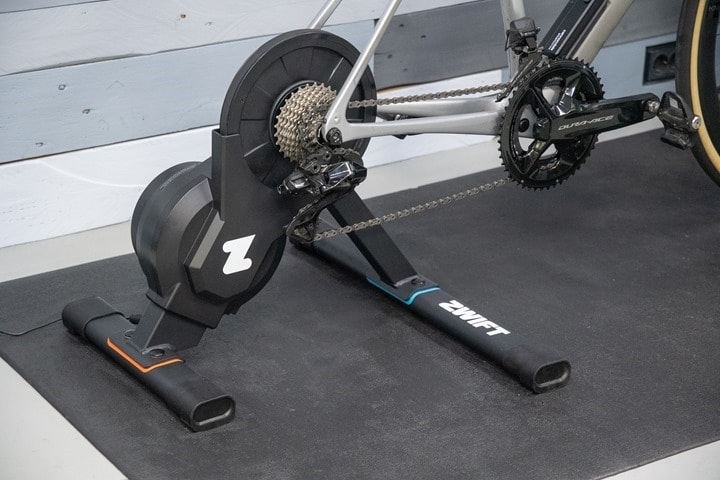
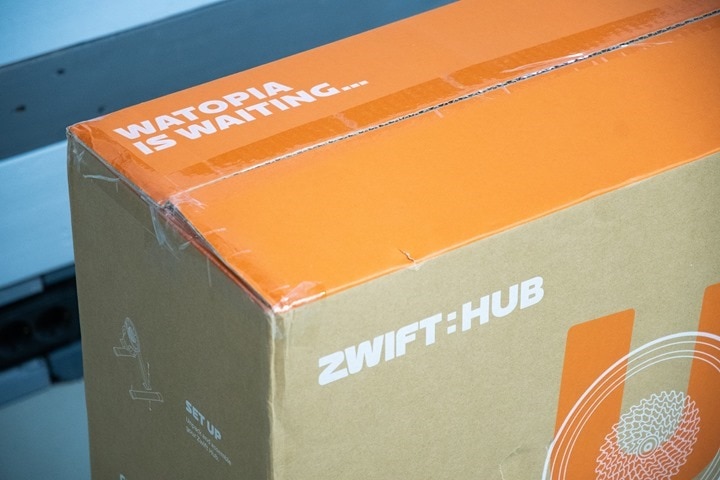
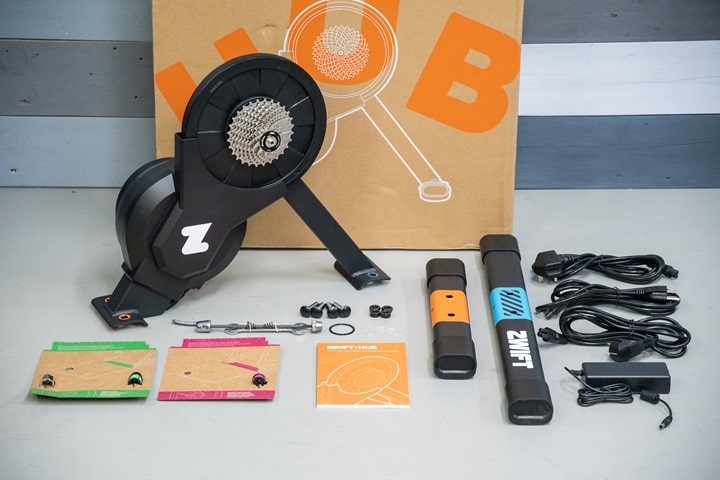
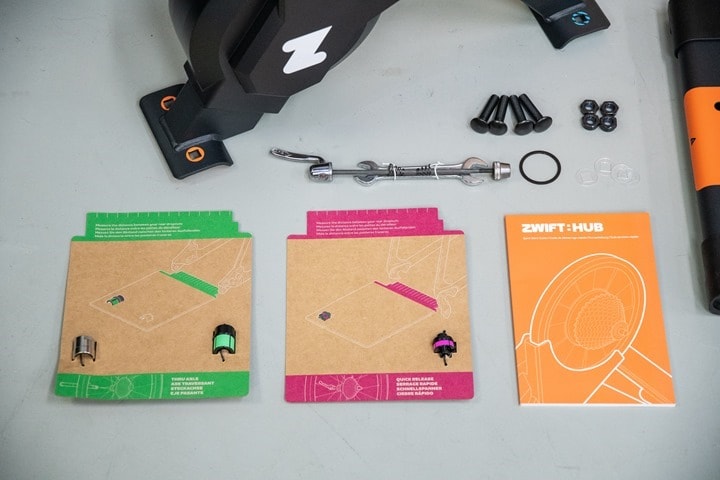
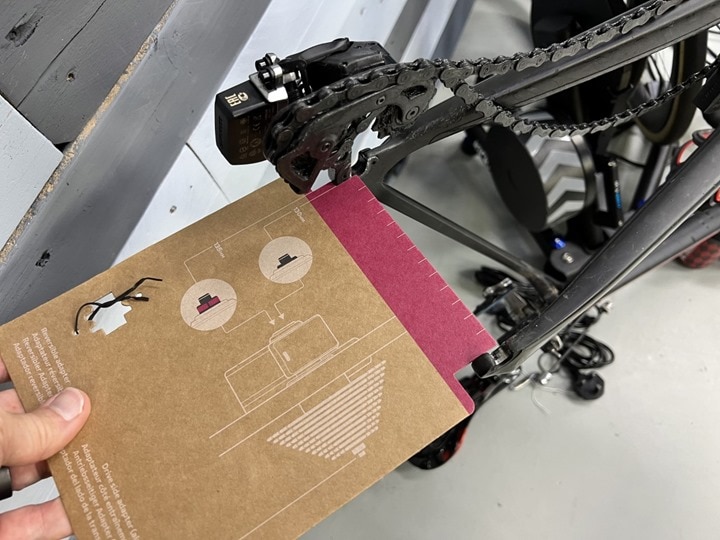


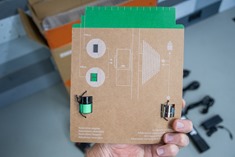
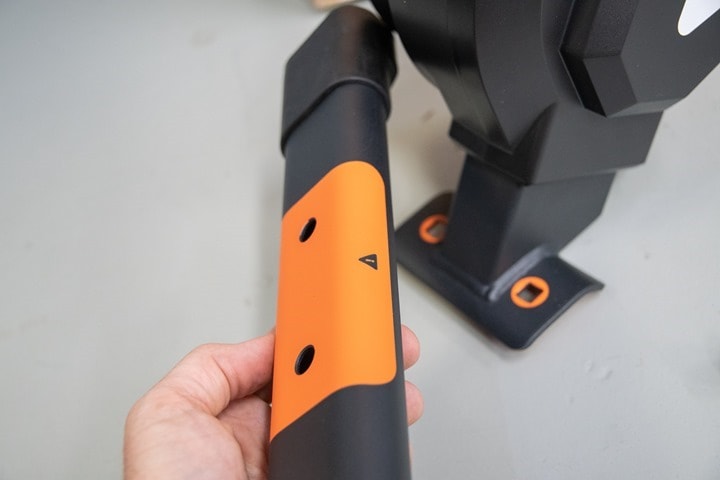
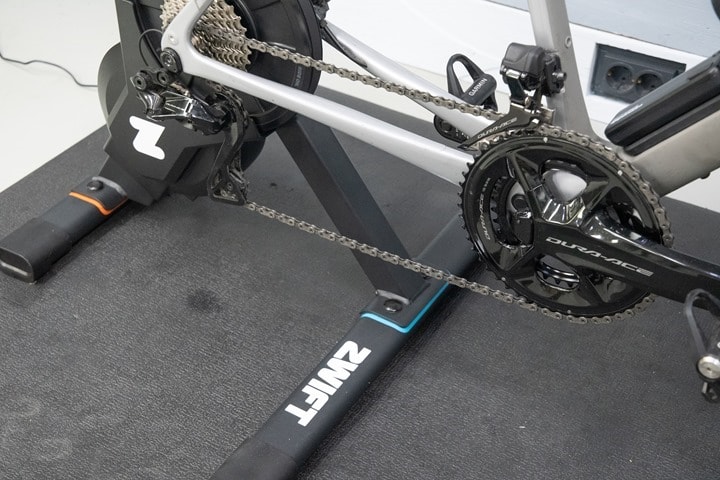

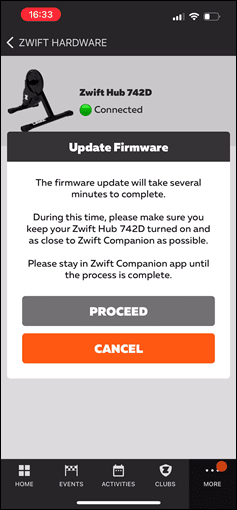
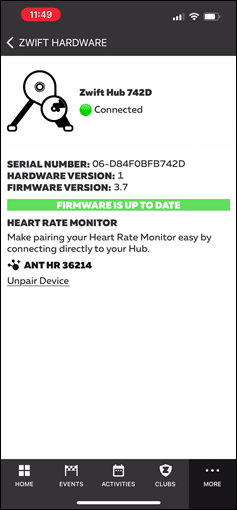
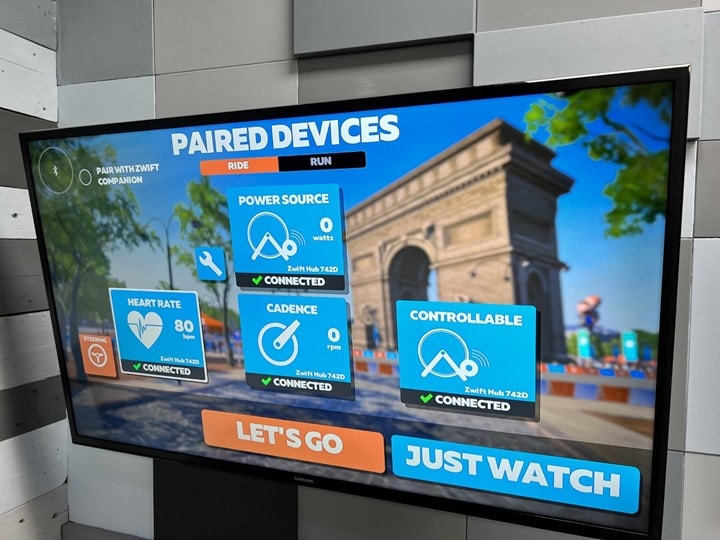
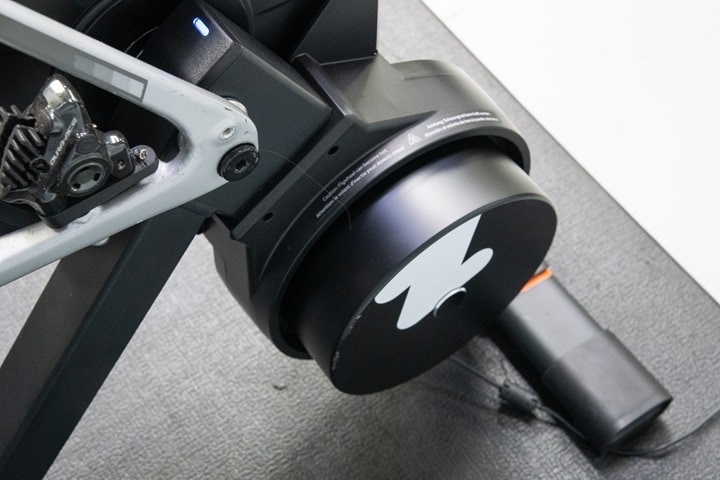
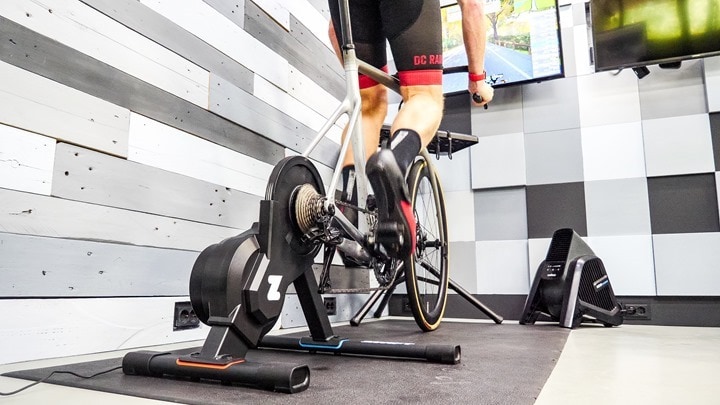
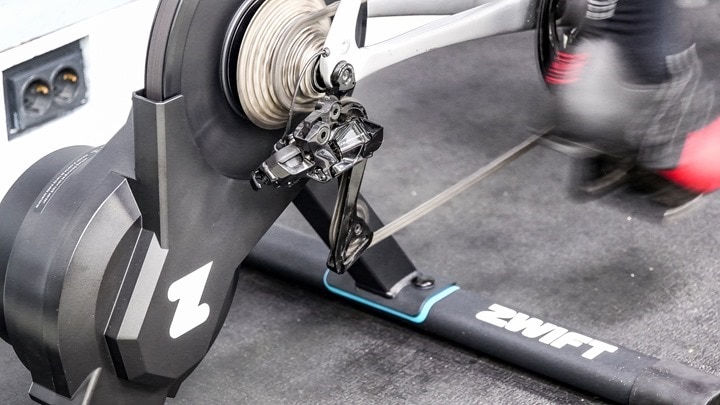
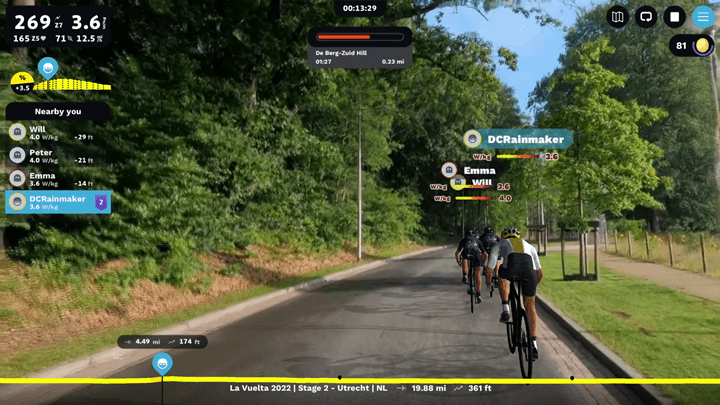
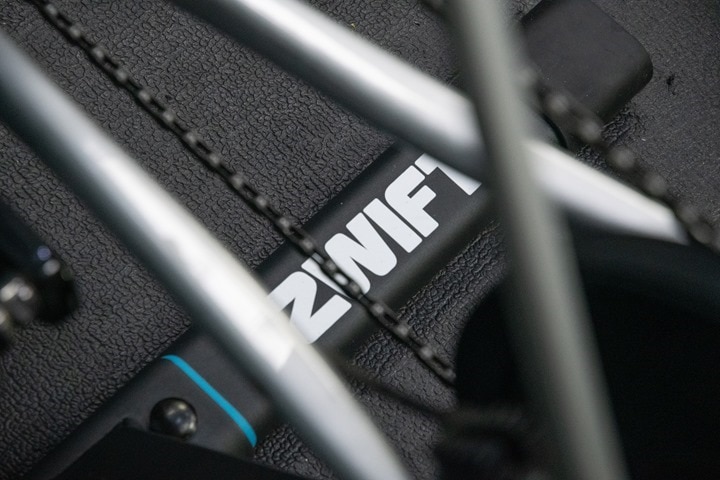
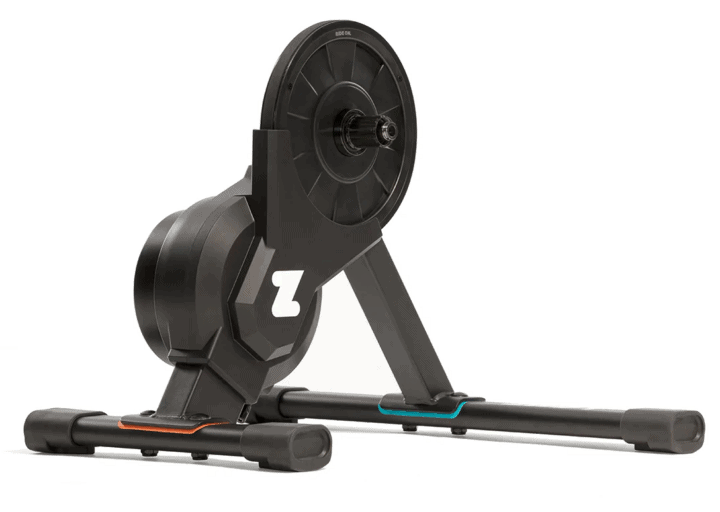




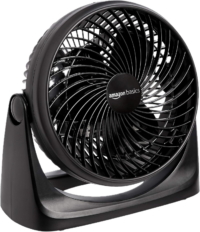
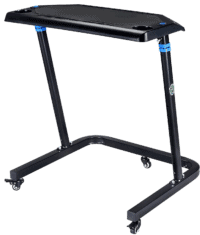
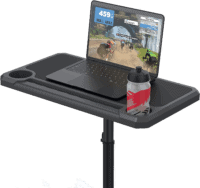

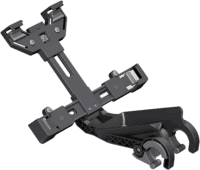
















“Pricing and Availability: $499USD, £449, 499EUR (but really about 700EUR street)”
Assuming the last bit was a hangover from the Volt review?
Thanks!
Funny that they release a trainer you can’t use in their top level racing (formerly premier league)!
Maybe, but this is likely just a first step. It seems entirely likely there will be at least one more option from them above this model, that would likely improve on that accuracy value at the very least. I also would guess that other options like multiple BLE connections, motion like the Wahoo Kickr Axis feet, or other features could be seen on the next level model.
Essentially, I am betting this new Hub model is only the start to Z hardware offerings, not the end. And starting with the budget model that is most likely to be adopted, especially at such an attractive price makes perfect sense to me.
I can also see a future where a Zwift trainer is required. Allows them some modicum of control/parity.
This is a rebadged JetBlack Volt. An exact copy of someone else’s hardware design.
So who would Zwift buy their “next level“ trainer from?
They’ll lose people if they try that.. Zwift isn’t the only game in town these days.. there are more and more options every winter… why would anyone downgrade from a Tacx Neo or similar to one of these..
Good point however I think their largest market will be those that aren’t serious racers and don’t care about the lose of accuracy. If faced with a choice of $500 for the same specs as my Kickr Core I think most people will save the $300. Especially those making the jump to direct drive.
@ Huh, there are at least two options I can see. It’s entirely possible that Z could work on improved internals to this same chassis and offer better precision and other features. This could simply the be the building block to improve upon with future offerings.
Alternatively, what’s to prevent Z from outsourcing from a different brand and using that higher level trainer badged with ‘Z’? No idea if Z or any other makers would head that way, but it’s not impossible.
I see no reason for Zwift ever to try to go upmarket. The racers and techies have plenty of good options and there is little to be gained by challenging in that market. Zwift has shown many times that their primary focus is to drive the bottom line. By making it as easy as possible for someone for someone to get on Zwift, they increase their chances for capturing some of the Peloton crowd. A basic but functional wheel off trainer that you could buy off of the Zwift site , like this, would be perfect. They do not have to be the least expensive, just the easiest to use.
In the future, I could see the value in an inexpensive/entry level bike for those people that do no wish to have their bicycle in their living room. The significant cost per item may be a big issue with that concept.
My biggest question is warranty issues/service after the sale. At this point, Zwift has no customer support capability. Trainers in general will have issues. Will Zwift be able to pivot and support their products?
I’m not sure how Zwift is going to modify this “new” trainer after they fired their hardware teams.
It seems they may well have “shifted gears” and moved away from totally new/unique development and may well have transitioned into something less intensive. They may be able to leverage the manufacturing and sourcing that JetBlack have already done, and work on refinement / improvement in various areas.
This seems to be the case with things like the focus on making assembly and setup more direct and transparent than any other company has done. The tighter integration to Z & the Companion app are additional extensions that require less people to make happen.
This could be the new end game for them or even just a stepping stone in what they might want to do longer term. This seem more like a fresh start with different options in their hands now vs the pure solo venture they previously has in mind (and terminated recently).
Hard to know what there next steps will be considering that I don’t think most people outside of Z even thought something on this level was likely, especially so soon after the dept. issues they handled.
Heck, I can even imagine that the potential increase in volume of sales and production may lead to better pricing and opportunities for both Z & JB. There are so many details and influences that we can only guess at, but I doubt Z did this with a narrow and limited scope in mind.
Scott, I think you need a new crystal ball (“I can also see a future where a Zwift trainer is required”).
It seems virtually impossible Zwift would ever require their own trainer. That would be a gift to their competitors who support all standard trainers. Why would anyone ever switch from one of their competitors to Zwift? Also, it would be difficult to come up with a solution that did not force all existing subscribers to buy new trainers – a good way to lose most of your customers.
This, spot on. I’m using a second hand wheel-on trainer that I have to calibrate every single ride, but i can’t afford 900+ for a direct-drive trainer (and jetblack seems hard to get in the US). It also feels wrong to pay more for a trainer then I paid for my bike. Having a 500 dollar direct-drive trainer is pretty huge. I’m already considering pre-ordering (I was saving for a kickr core, but I have zero interest in the climb, so meh). This type of thing gets more people riding in their garage, and that’s good for Zwift’s bottom line.
Is it similar or identical to the jetblack volt?
Amazon in the UK currently hve the jetblack volt for £499 so is there any benefit to the zwift version if you know how to put a bike on a trainer?
Zwift says it’s identical, and that there are no hardware changes. I don’t see any software changes either, as the same features were available as the Jetblack Volt.
The only hardware differences are cosmetic (coloring), and box-related. In terms of software, one minor difference is you can update the firmware via the Zwift Companion app, versus the JetBlack app with the Volt.
Cool, thanks.
Hopefully there will be a firesale of the JetBlack versions now then, well I can hope!
They’re down to $499 on Amazon US right now.
Hi Chris, there will be no fire sale on JetBlack Trainers. We will continue to sell the Volt and our accessories around the globe. You will see JetBlack Matching the Hub price in the Zwift Markets. Happy training, Murray
Per Zwiftinsider, there were small hardware changes to accommodate a greater variety of framesets. link to zwiftinsider.com
That’s only with the 11 speed cassette, for those of us still with 10 speed waiting for the Zwift Hub saves £50 + the price of a new cassette
I heard that the Jetblack volt doesn’t accommodate disc brakes whereas this does – is that correct?
There is more nuance than a pure black/white yes/no. The initial and current Volt frame has at least some known compatibility issues, clearly stated on their product page. Notably, they acknowledge the issue and that a fix is pending for all future versions of the Volt & Hub models. The official JetBlack rep touches on it further down in the comments if you want to read more (Murray Healey).
link to jetblackcycling.com
We have found some Flat mounted Disc braked bikes Brands will not fit into the VOLT™ due to the Disc mount and VOLT™ making contact. Brands we are aware of are:
– Scott, Cervelo, Factor, Look, 3T, Fuji
We advise you check compatibility before purchasing if your Disc Brake is mounted on the flat rear stays of your bike. This issue is currently being resolved.
Saris H4, eh? 🧐
Now, how about rebranding a smart bike and slashing its price? 😉
Zwift is just cringe worthy at this point.
Yeah… people hate having options that are more affordable, more functional and well thought out. WTH is Z thinking??? /s
Says the sponsored by Zwift guy.
Who’s the Zwift sponsored guy?
Why? Because they are doing what almost everyone suggested for them to do instead of building their own hardware?
They’re obviously a couple years too late to take full advantage but rebranding hardware is still the correct strategy for them.
Seems like the elephant in the room here is how are they meeting that price point? Was the profit level on the original trainer so high that they could cut it this much? Is it because it’s only available direct from Zwift so they don’t have to worry about selling at a discount to retailers? This seems like a very aggressive price point, especially given that the same trainer retailed previously for $350 more.
Where did the JetBlack Volt retail for $350?
As for profit margins, two things:
A) Yes, its only Zwift.com, so yup, they remove that retailer profit.
B) Zwift’s goal here isn’t to sell hardware though. It’s to sell subscriptions. That’s the key thing to remember. In an ideal world, you make money on both. But in a VC world, you care about forever-recurring money. So $15/month is $180, assume a 3-year min trainer life, and that’s $540 in revenue.
I suspect it’s a mix of factors. Z is likely willing to sell with minimal margin, or even at a loss, in anticipation that the sale will lead to a direct connection of a Z subscription to make up for the sacrifice in the single hardware sale.
This price and better incorporation of everything from the basic assembly to actual connection process (now and in the future via FW updates) aim to provide a user experience that solves many of the problems seen with so many users prior to this more integrated and planned concept.
They may also be buying/building at a volume that helps reduce cost on their end which helps either scenario above. I suspect they may be taking a larger gamble on quantity goals than what JetBlack might have done as a lesser known option in the market.
And from a cynical standpoint, the prior VC raised and then detaching a large number of employees in the old hardware division may have opened up funding to take a loss here as well. No idea if any of that is the case, but ways I could see them planning here.
Also wonder if JetBlack had to much inventory and happy to empty a warehouse…
That sure could be too, if they made a bad bet like Saris did. Interesting thought.
@dcrainmaker: I meant $350 more than $499, i.e. $849. Sorry for the confusion.
So a loss leader to put bums on seats for Zwift. Will be interesting to see how others respond to this. Most of other companies, barring maybe Wahoo with their own platform, won’t be able to afford to compete.
DC, he’s saying it retailed for $350 MORE, not $350 TOTAL.
“@dcrainmaker: I meant $350 more than $499, i.e. $849. Sorry for the confusion.”
Ahh, sorry, misread that as $350, which I was like – WOAH, that would have been a steal!
in addition to the full warehouse, they may have already fully depreciated the trainer so the only cost is the parts/labor. With trainer turnover, for awhile, being every 18-24 months, the depreciation schedule may have been aggressive.
dr_lha was saying the Volt retailed for $350 *more*… not for $350… otherwise your reply seems right on… low margin/loss leader to drive subscriptions.
Hi Stephen, JetBlack had no inventory issue. We were one of the lucky ones with delays in production. JetBlack was simply contracted to help get the Hub to production. No more and no less.
As I commented on the original Volt review, it was available at 380€ at Decathlon Spain website, and some weeks before at 450€ on some EU online retailers.
In the original review of the JetBlack volt you said
“Overall, I’m pretty darn happy with accuracy here. While there were some early firmware reports of very small amounts of drift, I don’t see that at all on current firmware, or during any of my testing. Accuracy appears to easily be greater than the claimed +/- 2.5% figure that the company has for their tech specs, and seems to be closer to the +/- 1% variants we see on many higher-end trainers.”
so hopefully similar issues and can be sorted with firmware.
Thanks for the review!
I’m interested to understand this bit:
“The last change is the firmware. Zwift has made the firmware their own, so it shows up properly as the Zwift Hub using standard protocols, and integrates with the Zwift Companion App for firmware updates and heart rate sensor pairing.”
The review makes it pretty clear that the sensors can be used with any app (ANT+/BT etc), but would a non-Zwift subscriber be able to use the Zwift companion app to configure this trainer (i.e. update firmware and so on), or are you basically tied into a Zwift subscription? Is that the gambit here?
Hmm, that’s an interesting point I hadn’t thought of.
I’ll have to see if I can change it using the existing Jetblack app.
Are you not able to use the companion app without paying a subscription?
If you have a paused membership or have signed up with your email but just use the free 25km a month are you able to use the companion app?
You can use Zwift without a paid subscription – you get 25km / month, plus I think running is still free (haven’t used it in a while, correct me if I’m wrong). So the companion app must still work. Granted, you still need the account.
When my Tacx craps out again (just a matter of time) I would have no problem buying this. I don’t want to think about my trainer, I just want it to work flawlessly when I get on the bike. Seems like this is it, and CHEAP.
So are they doing a razor / razor blades model with respect to pricing? I’m curious how much of a loss they are taking on each unit. And how Wahoo, etc. will react. It is hard to believe they would match the price or give up the low end. Do you have a feel for what % of trainers sold are low end vs. high end?
It should be two instead of too here: TrainerRoad or Rouvy, to name too
I have to say I am considering ordering this: I have Assioma pedals, a Spinbike and Rollers but always was tempted to try a connected direct drive – but looking for the correct adapter and adding a cassette etc. always put me off. The condition for me would be to be able to use Rouvy or other Apps. I only take monthly subscriptions and change the platform often.
Last summer, Zwift closed its Canadian store and made it so that Canadians could no longer buy zwift products. Does this mean that no one in Canada will be able to buy this new trainer?
It’s currently only going to be sold in UK/USA/EU.
Looks like ill have to fire up the ol freight forwarder… i was about to pull the trigger on a STAC -> 4iiis upgrade, maybe ill wait the couple weeks.
What does this do to the former entry level crowd like Kickr Snap?
I think it basically kills the wheel-on category at that price point. In my mind, those trainers have to drop to sub-$350 to be considered.
The SNAP is potentially the only exception, if someone wanted the KICKR CLIMB. But how many people, in 2022, are buying a new SNAP and a CLIMB? I’ve gotta imagine that’s a near-zero number.
Interesting – any thoughts on what Zwift means by “With Zwift Hub you’ll feel every hill, descent, and *draft* from your fellow Zwifters.”. No trainers today allow you to feel the draft as far as I’m aware …
I suppose technically you do, since the power required to stay a given speed reduces once behind the draft.
That’s true, but not what I think most people expect. If you are riding outside and catch a draft, you could keep pulling at the same power and run into or past the rider providing the draft, in a way similar to what we experience in Zwift.
What I think most people want or expect is an actual change in sensation at the pedals when we catch a draft in Zwift. An actual perceptible feedback through the trainer, other than the screen display, that reduces the resistance level just enough to feel.
One of the other trainer apps (can’t remember which right now, but maybe VirtuPro?) seemed to be claiming to have this feature in hand from one comment I saw long ago. No idea if they did, but I can imagine that the reality of making this happen is tougher than we might expect and might explain why neither Z or anyone else seems to offer it.
Point taken, but I’m not sure you feel that.
Technically this seems quite feasible to implement feel through an effective change of resistance for a given speed – equivalent to hills – but right now if you’re doing 40 kph and come up behind someone you don’t feel any change in resistance. If you choose to reduce power you’ll keep the same speed, but that’s not feel in the same way as hills / descents..
But agreed it’s probably just cute marketing language.
Actually the ftms protocol supports 4 parameters (wind speed, grade, coefficient of rolling resistance, coefficient of wind resistance/drag). So technically any trainer could respond to a change of drag sent by the app over ftms. Some trainers do it, some don’t.
Very interesting, do you know if any Apps support it?
Zwift put out a tender for a smart trainer?
Jetblack had the most competitive bid at $499?
Zwift is bringing the trainer to market at $499 to help bring down the up front cost of joining Zwift?
exciting times
And to inhibit spin bikes.
How would this trainer differ from something like the Kurt Kinetic RS which seems to see for $349? link to kurtkinetic.com (I did look for a review of this on your site and couldn’t find one.)
I can easily see this being sold with a 3 months of Zwift Bundle to get people hooked.
This not being sold to Canada news, however, is some hot garbage.
For starters, the Kinetic RS is not a fully fledged smart controlled trainer. It is effectively a dumb magnetic trainer that reports an estimated power based upon flywheel speed. It does not change resistance level from simulations like Zwift, Rouvy and the like. Nor does it change resistance to match ERG based workouts like TrainerRoad or those other apps.
The Kinetic RS requires the user to change resistance via shifting gears on the bike, just like all the old fluid and magnetic trainers from years past. The KRS is a fine trainer for what it is, but it is nothing like the new Hub trainer. The KRS is more like a direct drive version of the old trainers.
And to cover the final base, the Kinetic RS is actually a rebadged Magene T100 trainer. This is because Magene bought out Kinetic some months ago (rather quietly) and seem to be trying to reposition themselves with the Magene trainer as the start of whatever new direction they have with the purchase of Kinetic.
Also, of note, the Kinetic RS is sitting in the DCR Cave already. Working my way through things!
Saris H3 right now for $430 is a much better buy. Better in every aspect.
Almost every aspect, yes. Two notables on the Zwift Hub though that are better:
A) It’s quieter (silent), versus the H3 isn’t that same level of quiet. Might not matter to most, but worthwhile noting.
B) HR pass-through
Again, lots of other areas where the H3 is a better unit (gradeint & wattage, road-feel due to larger flywheel).
Where is the H3 on for 430? Im only seeing 550 USD or 900 CAD type prices
Saris ran a special code over the holiday weekend. I just checked after adding one to my cart from the official Saris site ($640 starting price), added “CSDEALDD-40” as the code, and it shows me a final price (shipped) at $384 USD.
Yeah, you can’t.
With the “CSDEALDD-40“ code, price comes to $858CAD direct from Saris, plus tax (bringing it to $969.54CAD), + UPS shipping of $240CAD + the likely import duties. We get royally hosed up here in Canada.
Looking forward to this Zwift/JetBlack bringing market prices down. I have my trainer but I’d like to buy a mid-high-end like this for family as a Christmas gift.
I thought I’d read somewhere else that they’d done a slight modification to the JetBlack body shape to allow many of those bikes that couldn’t fit on the JB Volt to fit on the Zwift Hub. Was I imagining that? That might have been a moderately trivial body shape change without changing the internals of the trainer if it was done.
There are mentions of better clearance for disc brake frames on the Zwift Hub. This seems likely based on the exception list currently shown on the JetBlack Volt product page. Notable though, is that JB acknowledges this and says they have a fix coming. Presumably, they are simple adopting the same change to the Hub design. No telling if they had already figured this out and that Zwift is the first to get the improve design, or if JB is lagging for some other reason?
Actually, looking carefully at some notes files from a month ago, there was mention of a slightly updated internal speed sensor, to fix some hardware fault issues. Though, I think JetBlack said that’s also going into their units. So my guess is it’s basically just a running change made for both.
I don’t have any notes on disc clearance, but I can double-check. My assumption though is that any changes like that are basically running production changes for both (assuming JetBlack is still going to keep selling their variant, which, I don’t know if they plan to).
Yes changes were made and both the Volt and Hub have enough clearence for Disc mounts. Always was on our list to change, timing of our frame change co inside with the Hub design and build.
Could be that you get a free 30 days with the trainer and that gets you the companion app that you can keep regardless of whether you keep the app (though, with the gym membership model, they expect you to).
Great.. more C riders who will magically become A riders with out to lunch numbers.. may cost 3 times more, but Ill take a Neo any day…
Except, umm, the data for the JetBlack Volt was just as accurate as a Tacx NEO (any series). Assuming they get that firmware back, why would this be making Cat-A riders?
If it’s accurate then fine..but I also know of several outdoor cat 5 riders who murder cat 2s on zwift who are riding legit power sources..
I’ll probably get one when it comes out. I’m on the original KICKR and its showing its age. Noisy, no integrated cadence, terrible accommodation of my 142 X 12 mm thru-axle and I use AppleTV. I’m old, can’t sprint past 1000W and haven’t raced since ’96. Only thing missing: adapters for my 197 X 12 mm fat bike. For us fitness minded Zwifters- plug and play is literally a no brainer.
i’m still on my first gen Elite Direto bought 2018 with original belt. knock on wood if ever this is a good option !
My Direto from 2018 just had the board die giving me no resistance. Had to layout 115 USD/EUR (including shipping and VAT) to get a replacement that is coming today. Hopefully that will fix the issue. Otherwise this Zwift Hub does look like a good replacement once it fails again.
Zwift branded, official trainer absolutely can’t have accuracy issues.
Somewhat unrelated, but did people see that Meta (Facebook) is running an ad featuring zwift?
link to youtu.be
I saw a shorter version on TV in the US.
And to inhibit spin bikes.
This is not a new trainer. It is a rebrand from JetBlack: link to jetblackcycling.com
Tell me you didn’t read the post without telling me you didn’t read the post…
I want entertainment… and this thread delivers :P
Excellent review. Could not have been more timely.
This is borderline hilarious and stupid.
They spend tens of millions of dollars starting their own hardware line focused on a high design super incredible piece of hardware and end up re-branding the Jetblack Volt, a second rate trainer?
And then they undercut Jetblack’s own price and every other trainer manufacturer, pissing off every one in the industry – hardware manufacturers, independent retailers, etc?
But its okay, Zwift will bring new people into cycling and save the industry. The independent retailers don’t help grow the industry and the existing hardware manufacturers don’t innovate (according to Zwift).
I doubt this move will change their rate of software subscriptions. But they did manage to give a huge FU to the entire industry. Bravo.
I wouldn’t call Jet Black “second rate”. Based on the review on this site it is a solid trainer that is at least the upper end of the mid-range trainers.
Still a super dumb move by Jet Black and Zwift. Short term gain but long term pain.
Thanks Bro
If they can sell the trainer profitably at that price point, why is that long term pain? Because it causes the rest of the industry to go from 80+% margins to 50-60% margins? Many of the pillars of the industry have rested on their reputation (and, yes, quality) instead of trying to create something more financially accessible.
Are Zwift/Jet Black doing this out of the kindness of their hearts? No. Do their competitors like them for doing this? No. Is this going to be good for consumers? Yes.
A little weird they are doing this while just announcing a new Volt V2?
In any case as a happy Volt user I hope this means we will get firmware updates for a long time.
Says on their site, $14.99 monthly membership? Is that for zwift or is that on top of zwift?
Ambiguous wording with no real details later in their post that I saw. But I am pretty sure that $14.99 is the regular Zwift monthly subscription fee and nothing extra.
I have an old bike with a 7 speed Tourney groupset in the basement on a Tacx Flux. Any idea if there would be a way (spacers of some sort?) to make this work without having to upgrade to at least an 8 speed groupset? Interested to see what’s coming over the next two weeks! Appreciate the timely and informative content.
Meant to say a tacx flow not tacx flux. Looking to move from wheel on to direct drive and this price point might be low enough to convince me.
7 speed cassettes exist but are uncommon. Other people have used them to adapt 7-speed bikes to direct-drive trainers.
Smart trainers have a 11sp road freehub, to use a 7 speed cassette will require 4.5 mm spacer, in addition to a 1.85 mm wide one (used when mounting 8 and 9 speed cassettes).
link to bike.bikegremlin.com
Just placed an order from Saris for the H3 for 384 USD out the door with the coupon others have mentioned. Then I saw this. Reading about so many people having a knocking issue with the Saris that the replacement screws didn’t fix – has me a bit nervous and wondering if Zwift Hub would be a better path forward. I’ve used a Kicker ’18 and thought it was amazing compared to an original Direto in terms of road feel and coasting. The Direto often felt like I was pedaling a fat bike through mud, where the Kickr feels like a road bike. If the Saris H3 vs Zwift Hub has this much difference in feel I’ll keep the Saris on order. Curious if anyone who has used the JetBlack can comment?
On their product page the subscription phrase sounds sneaky.
As you can’t order it now they do big buzz around the 499.
But maybe when the real order process is live you can only get it with the subscription on top which closes out the competition and adds another £300/360€ .
If you read the comments here, Murray Healey from JetBlack has said they are matching the price (for the exact same trainer – just different firmware) in the same markets that Zwift is selling in. So if Zwift was doing what you and others are suspecting, no one would buy the Zwift Hub, they would just get the JetBlack Volt. JetBlack wouldn’t sell the same bike at that price if they weren’t making money – so it isn’t even a loss leader. In fact, the price for the Volt on Amazon right now is $499. Maybe it doesn’t really cost as much to make a trainer as we thought ;).
Oh Look .. the price of the Jetblack volt has dropped to $499 USD on Amazon …. :) So the price drop of midrange smart trainers has started already … Be interesting to see if the core drops in price now..
I have a Volt since one year. I like the trainer, nearly silent and power numbers compared to my crank pm inside the tolerance. However the app is really a mess, need it only for updates and calibration.Often I have connectivity issues and have to repair several times, also is the interface not user friendly. Hope I can use the companion app, or at least Jetblack improves the app.
Hi Mario, we recently released a new Volt app to look after Calibration and Firmware updates specifically for the Volt. Very easy and clean. JetBlack Volt app now available onshore. You will be happy to know, we will be releasing Auto spin down within the next month. This way you will not need to use the App. Happy training.
@Murry Healey – I’d like some further clarification about the Volt v1, the Zwift Hub, and the Volt v2.
Can you confirm that the v1 is still getting the auto spin-down calibration? This is listed as a Volt v2 feature at launch, but your comments above on v1 indicate it will get it also? Likewise, the Zwift Hub is planned to get it.
Is v1 getting (or already received?) the changes that the Zwift Hub implemented for improved frame compatibility? I saw comments about a possible Volt v1 running change. Are these done? Do all new v1 units in the supply chain (for example from Amazon US) have these frame compatibility updates?
What will the differences be between the Volt v1 and v2? If the v1 gets the auto spin-down calibration and frame compatibility changes, then it looks like the main remaining difference will be accuracy? v1 is listed as 2.5%, and v2 is listed as 2.0%. Anything else that I’m missing?
Are there any other hardware difference/improvements for the Volt v2?
Is the Volt v2 still launching at $1200 USD, vs. the v1 (and Zwift Hub) new price of $499 USD?
A chart or graphic on your website that clearly shows the hardware or feature differences between the v1 and v2 to justify the proposed $700 cost delta would be appreciated. With the accuracy levels that Ray found in his Volt v1 testing (it was very good), I’m currently struggling to understand why v2 is planned to be so much more expensive than v1. I just want to make sure I’m not missing something that might be important to me.
Good article !
Im a level 50 Zwifter for years, Tron bike, blah blah blah but this is a must have for me. At age 60 im looking for ease of use, functionality and accuracy. Not looking for a $1500 trainer that Id need an engineering degree to have it be accurate.
“Not looking for a $1500 trainer that Id need an engineering degree to have it be accurate.”
– Perhaps ironically, these higher end trainers often require less work from the user to be “accurate”. They use better designs & implementation to yield higher level of precision & accuracy. That’s true even though these often have little or no need for the user to even calibrate them for this to work.
– It’s the lower cost designs that actually require proper setup & calibration by each user to get the most from them for accuracy. They require calibration more often (sometimes each ride in the case of a wheel-on trainer) in order to have any chance at good data.
– Sadly, many users new to smart trainers have no idea about these requirements and end up just using the trainers without applying proper practices, which ends up with bad data widely used. So it’s actually the more expensive trainers that are essentially “set it and forget it”, not the other way around like you mention.
– This is all changing over time with better trainer designs and education of users, but it’s a mistake to assume that the most expensive trainers require a higher level of knowledge by the user. It’s pretty much the opposite of that in practice.
Will my jet black volt get a firmware update to this?
Hi Nicholas, yes we will be pushing out a firmware update within the next 6 weeks. This will include Auto Spin down. Taking away the need to re calibrate for accuracy. As Chad points out, allot of work goes into making and keeping trainers accurate. The more units we produce, the more calibration information we get from the factory. We are now in the position to have thousands of trainer logs from factory calibration, giving us more data to work with. End result, a more accurate and better performing unit. Agree with Chad, Units are limited by hard ware and Jetblack is committed to making the Volt one of the best performing trainers. We are not one to sit back….always room for improvement. Happy training.
Looks like JetBlack has dropped the price of the Volt on their website also. link to jetblackcycling.com
Yes! Same in Europe, 518 EUR incl. 11 speed cassette. If all the adapters are included it seems to be the same as the swift edition.
Hi, Just tried the Tacx Flux 2 in store at £489 inc garmin chest heartrate monitor. Felt great to ride in zwift and more stable than elite suito out of saddle which I also tired and didn’t like as much. It has a larger flywheel than zwift hub but know there’s been some accuracy issues and erg mode issues but not sure I’ll use erg mode – is it worth waiting for the zwift hub?
Thanks for your reviews, they’re great and really informative.
Cheers,
Jamie
The good news is it wasn’t designed by Zwift but how many zwifters are going to need or want this?
I see two main groups with just a quick bit of thought:
1) New Zwift users looking for their first trainer, and specifically one that makes getting started as easy as possible.
2) Existing Zwift users with wheel-on trainers who want an upgrade, but do so without stepping into the top tier trainers at $900+ USD range.
There are likely others since Z has done more than a bit of research considering the surveys they have issued over the last couple of years. I suspect they have a decent view of how this trainer sits with their growth targets.
People who don’t even Zwift will buy this. I have a friend who’s almost entirely using Garmin/Tacx training apps – this would be perfect for them.
Hi DC. Could you post the dimensions please, the training shed is tight on space and can only accommodate narrow trainers. Thank you
Nice!
hi, I’m intermediate cyclist (cycling for generally health and personal effects, not for racing).
I’m wondering: should I buy wahoo kickr core or zwift hub?
I’m planning to use Zwift app, and want to share my rides on strava, it’s possible?
Matt – Zwift links seamlessly with Strava. When you save a ride on Zwift it shows up in your Strava activities like any other ride.
Any idea if this trainer will work with the Elite Rizer?
I’ve been planning on upgrading my first generation Kickr to a Kickr Core + Climb, but at this price point, I think the Hub + Rizer comes in at a lower cost which would completely change my decision making.
n
“And that’s largely because Zwift repeated numerous times in our conservation”. You sure mean conversation, right?
This is not a game changer from Zwift. Buying a 3rd party product and not owning the tech support from the get-go. Great for a new starter or on a serious budget but I am still elbows deep on the high end for my use.
All I can say is good luck on the after service. Local bike shop all the way for me.
Do you have a new Canyon bike? -)
I am just wondering what will be the price after the release.
I checked 12s cassete price, and it’s more like 110€ alone, not counting in micro spline freehub.
Similar applies for Sram XDR (which they stated, that You can buy the trainer alone, and mount cassette by yourself), so I am wondering, if the price 499€/$ is for Trainer + basic cassette let’s say Shimano 105, and may vary for the other options, or they will sell it for the same price in most of the options? (I think, aftermarket will be polluted by the units without cassette)
The price is the price, it’s $499 including cassette, no matter which toothed cassette you need.
So it does not make much sense to order it without cassette, unless the price without cassette is lower.
OK, so it is the same price, with or without cassette.
Strange.
Hi Ray,
do you know if Zwift integration will force to use this Zwift trainer as power source, or if it will still allow to select an external powermeter for better accuracy and better correlation with outdoor rides?
Other question: my present trainer bike is Campy 10sp, so I understand I will need this sort of accessory:
link to jetblackcycling.com
Any idea of the release date and final pricing?
100$/€ or 20% of the trainer price seems a bit overpriced to me…
There’s no difference between using this trainer and any other trainer, in terms of the Zwift pairing/data source scenario.
I live in Southern California and can generally bike year round, and much prefer cycling outside rather than in my garage. So given the relatively high cost of direct drive trainers, I never seriously considered buying one. However, at this price point, level of features, and the opportunity to Zwift, I’m willing to bite to cover those days when cycling indoors is preferable and just for the workout variety.
What main advantages does this offer over the €250 Tacx Flow? Is it worth coughing up the extra for a beginner cyclist?
A friend has the Tacx Flow. 100% get the Zwift Hub. The Flow is fine but its selling point was the lowest cost smart trainer you could get. Zwift Hub/JetBlack Volt offers the experience of a $1000 trainer for half the price.
Wheel-on means you’re always checking tire pressure, and it will always have an amount of wheel slip, like accelerating in sand. Direct drive is WAY more engaging.
Test ride some wheel on and direct drive trainers at a local store – difference should be apparent.
Thanks!
So Zwift is selling trainers cost so that everybody can have a cheap trainer? I didn’t know Zwift was so benevolent. One possible business model we could look to for guidance is the telecommunication carrier market. What if they sell their hardware either locked or unlocked, you get a deep discount on say the Wahoo Core if you sign up on a plan for Wahoo SYSTM. And if people wish to leave the wahoo/zwift ecosystem then you pay an additional fee to unlock your trainer.
Zwift has said they’re selling them at a profit, and I believe that. My guess is probably making $50-$100/unit (hardware alone, then there’s support/etc costs).
Zwift has also made it clear the hardware isn’t locked to their platform, and is using the open standards.
We’ve actually seen companies try hardware locking before, in an era a bit ahead of Zwift perhaps 5-8 years ago. BKool tried it, even going as far as making the open protocols compatible when you paid your monthly fee, but not if you didn’t. Obviously, they didn’t work – and they exited the hardware biz.
While Zwift is the big dog in town, there’s also a lot to be said for how overpriced trainers have gotten, relative to their actual costs.
I don’t think anyone suggested that Zwift is doing this for some altruistic purpose.
They are clearly a company with a profit in mind. They have stated that even at the $499 price, they are making a profit on the trainer sale. It may well be a reduced profit margin compared to other trainers and makers, but a profit vs a draw or loss leader as some speculated.
It’s also pretty clear they are hoping that people buying the Hub will also step into a Zwift subscription that is their ultimate goal. The trainer is their attempt to make the transition from a non-user into the World of Zwift easier than the known problems that we have seen from so many users and trainers over the years.
Good for them, good for users, but still a capitalist venture with making a living at the end of the day.
I would define profit as being after all outgoings. That is, including fixed costs like back office, customer support, rent, financing costs, etc and I suggest they would be greater than $100 profit made on the hardware, and therefore they are providing the Zwift Hub at less than cost.
If the real cost is as low as suggested then pure-play trainer companies like Jet Black who were previously selling their product for $850 through a retail outlet (with, say, a keystone markup of 40%) would be a making a profit of 20% based on a total cost price of $500. Selling directly from the factory door would imply a profit closer to 35%. (Apple has a profit markup of 25%). These levels of profit are simply not supported by the financial reporting of similar companies.
Zwift will have lower fixed costs than Jet Black because of scale and an already existing platform. However this is partly offset because I assume Zwift Hub’s cost now include licence fees paid to Jet Black for every trainer sold.
Another way of looking at it is that Zwift subscribers are subsidizing people buying the Zwift Hub who do not use the Zwift ecosystem and something will need to change going forward.
As for hardware locking, that was one possible direction I was foretelling for the industry. Obviously 8 years too late, like all my best ideas.
If you had to choose (purely on quality and specs) between the zwift hub and elite suito. Which one would you choose?
Based on Ray’s reviews (excellent as always), the comments and the much appreciated replies from Ray and Murray Healey here, I just ordered a Jetblack Volt on their EU website.
For others interested, it seems that the price including the 11 speed cassette dropped further today to now 447,95 € incl. VAT (& approximately 10€ for shipping) on such site.
Hi DC,
the jetblack only costs 449€ in several shops here in germany. Is this the better deal or should we wait for the Zwift?
Hi DC,
Have you already reviewed the new firmware (as promised) and if so, does it solve the accuracy problems?
Kind regards,
Mathias
And finally… is a one question. What shall I buy? Zwift hub vs wahoo kick core vs tacx flux 2 ? That will be my first device like this ;) I wll be grateful for your recomendation. Regards from Poland.
P.
Nice piece, any update on the accuracy issue you mention
It really seems a good bang for the buck but… If you could buy the Elite Direto X at the same price (500€) which one would you choose? (actually, the Direto even cheaper, but I have to add the cost of the cassette, so basically the same)
Was on the fence between an H3 and the Hub. I figured the H3 would likely be a better purchase with most of the bugs worked out, where the Hub could be a nightmare like the 18 Kickr. Someone gave me this code on on the Trainerroad forum…SCG-50-BLACKHAWK…gives you 50% off the H3 which makes it $400 shipped, can’t beat that.
Did anyone see 12-speed version available? It’s morning, and I can see sold out on this particular version :D
I ordered my 11-speed exactly at midnight. All versions were available. With the world situation in terms of electronics and the big interest, it was logical for me, that it sold out immediately.
Already all the versions but the 8-speed one are sold out.
Even the no cassette option, funny.
Zwift clearly did not prepare for the demand.
But Jetblack Bolt is available for 447 EUR with 11 speed cadsette now.
link to jetblackcycling.eu
I see that also. Any reason to wait for zwift or is buying a jetblack the same thing?
Jetblack has only 11s option, while Zwift offers also 12s, which makes it more affordable as far as I understand.
Freehub body for 12s + cassette is extra 160€
I just need an 11 anyway. A bit too slow this morning after a night out at oktoberfest. Woke up and everything was sold out 😅
Ouch, I can’t make my mind:
– Zwift Hub: 499€ with cassette.
– Jetblack Volt: 448€ with cassette.
– Elite Direto X: 460€ without cassette.
Between Jetblack Volt and Zwift Hub I cannot find any reason to spend 50 extra € on the Hub.
Between the Direto X and the Volt I’m not sure: the Direto seems more accurate (+-1.5%) than the Volt (+-2.5%) and I would happily pay the small difference in price for that increase in accuracy, but on other hand, the flywheel is smaller (4.2kg vs 4.7), seems noisier according to some reviews and it doesn’t include a cassette.
Any help?
Any idea when Zwift will resupply?
next week
Yup, (obviously) Eric’s note matches what I’ve also heard from Zwift directly on it as well (more stock coming next week).
Considering the Saris H3 (with a discount) or the Zwift Hub? Any recommendations either way?
Just a quick update for folks following along in the comments section – just in case you haven’t seen it, my full in-depth review with all the accuracy data is now posted here: link to dcrainmaker.com
Is there still a working Saris H3 discount? The ones I found don’t seem to work for me today.
Have you received the latest firmware? If yes, when will you do a final review?
Multiple news sources today are reporting that Wahoo has filed a patent infringement suit against Zwift and JetBlack. The main allegation is that the unit is ““identical, in all material respects, to the KICKR CORE,”
Wonder if this is just the tip of the iceberg, with similar actions to be pursued against other manufacturers?
link to bicycleretailer.com
You’re mentioned here – link to bicycleretailer.com
I purchased one right after it was released. So far, it’s a paperweight waiting for the SRAM freehub assembly for my 12-speed SRAM eTap that seems to be backordered through JetVolt. I’m surprised they didn’t have this figured out. I would have just purchased a second Neo 2T instead, despite the extra cost.
Yes, I have contacted Zwift, and it seems they do not sell SRAM freehub. They have adviced mé to purchase it through Jetblack, but I can not get that in my country I guess, abd as you said, there is a waiting list for it anyway..
I am very surprised Zwift ignores SRAM XDR 12-speed customers. Most probably they have enough other customers to handle anyway.
You did not mention warranty or support in case of issues.